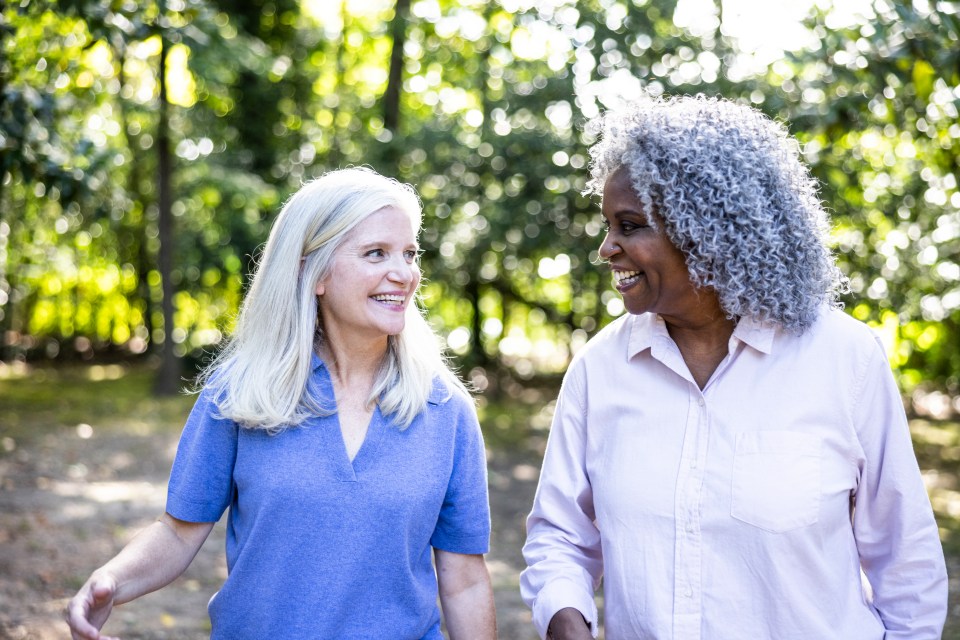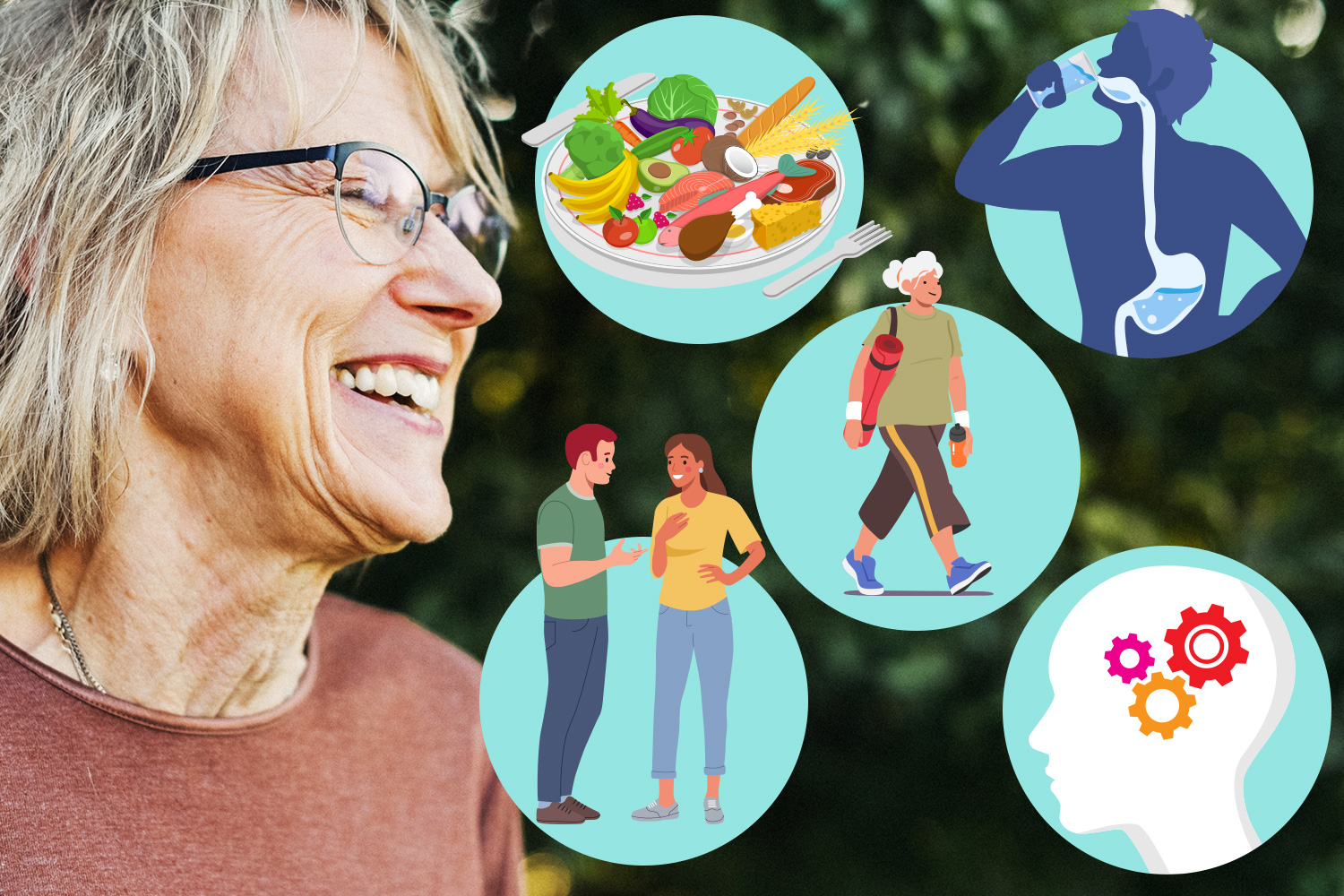MANY of us want to live a long and healthy life – but how often do we think about the things we’re doing now to help us get there?
A five-part quiz created by experts may reveal how well you’re ageing.
3
Are you doing things right now to help you live longer?Credit: Getty
Developed as part of the Take Five to Age Well project by The Open University and Age UK, the quiz asks a series of questions that may prompt you to take action.
Many factors influence healthy ageing, some of which aren’t in our control, while others are within our reach.
Genetic factors cannot be controlled, but many affecting our physical, mental and social well-being can.
Jitka Vseteckova, Senior Lecturer Health and Social Care at The Open University, and Lis Boulton, Visiting Research Fellow at the university, identified five key areas – known as the Five Pillars for Ageing Well – they say form a “strong foundation for staying well and thriving in later life”.
Read more on living longer
And it’s these five pillars that form part of the quiz.
1. Are you eating well?
Eating healthily means consuming a balanced diet with a variety of foods, including fruits, vegetables, whole grains, and lean proteins, while limiting processed foods, sugary drinks, and unhealthy fats.
One diet associated with various health benefits is the Mediterranean diet – a style of eating inspired by the traditional dietary patterns of people living in countries bordering the Mediterranean Sea, particularly Greece and Southern Italy.
It emphasises plant-based foods like fruits, vegetables, whole grains, legumes, nuts, and seeds, while also including healthy fats like olive oil and moderate amounts of fish, dairy, and poultry.
Red meat and processed foods are limited.
Writing for The Conversation, Vseteckova and Boulton say: “Diets like the Mediterranean plan are linked with a lower risk of dementia and other chronic conditions.
“Malnutrition is a serious concern in older age, especially when it comes to maintaining strong muscles and bones.”
2. Are you staying hydrated?
Drinking enough water is vital for maintaining bodily functions, promoting overall health, and preventing various health issues.
Not drinking enough can cause dehydration and affect cognitive function, mood and energy.
Vseteckova and Boulton advise: “Cutting down on sugary drinks can help you to maintain a healthy weight and staying within recommended alcohol limits can also help lower your risk of conditions like dementia. Hydration really matters.”
But they add for people with life-limiting illnesses or conditions like advanced dementia, appetite and oral intake may be severely reduced.
And sugary drinks may be one of the few sources of calories they can tolerate, so hydration should take priority over strict nutritional guidelines.
3. Are you being physically active?
3
Just walking more can boost health and prevent diseases like osteoporosisCredit: Getty
Being physically active is crucial for both physical and mental well-being, offering numerous benefits such as reduced risk of chronic diseases, improved mood, and increased energy levels.
Just walking more can boost health, say Vseteckova and Boulton, and when paired with good nutrition, can help prevent degenerative disease osteoporosis.
Swimming, cycling, dancing, and activities like yoga and Pilates are also recommended for older adults.
And studies have shown it’s never too late to start exercising.
One study published in 2019 found older adults who’d exercised consistently since they were teenagers had a 36 percent lower risk of dying.
But that number was similar to the results for people who’d been inactive in their youth and only began exercising regularly in their 40s, 50s and 60s.
4. Are you connecting socially?
Social connection is a fundamental human need, crucial for both mental and physical well-being.
Strong social bonds provide emotional support, reduce feelings of loneliness and isolation, and contribute to a sense of belonging and self-worth.
Furthermore, social interaction has been linked to improved cognitive function, a stronger immune system, and even a longer life.
Vseteckova and Boulton explain: “Loneliness increases the risk of depression and cognitive decline.
“Building strong social ties earlier in life can help protect well-being over the long term.”
5. Are you challenging your brain? 
3
Doing crosswords has been shown to potentially delay dementiaCredit: Getty
Challenging your brain is crucial for maintaining cognitive function, enhancing mental abilities, and potentially delaying cognitive decline.
This could involve learning, reading, playing an instrument, or trying something new.
Studies show activities like crossword puzzles or new physical activities can potentially delay dementia.
“There’s no magic fix, but even small actions can have lasting benefits,” quip Vseteckova and Boulton.
The Take Five to Age Well quiz is part of a free, expert-led, month-long challenge which supports participants’ current habits and needs.
Vseteckova and Boulton say: “We developed the Take Five to Age Well quiz to help people reflect on how they’re doing across these five areas – and where there might be room to grow.
“The follow-up resources are based on real-life experiences of ageing from diverse communities and offer small, achievable steps you can start today.”
Tips for living longer
Live happier and healthier for longer with the NHS’s top 10 tips:
Watch what you eat and drink
Eating a healthy, balanced diet is crucial for good health, energy and preventing illness.
Look after your teeth
Brush your teeth twice a day and floss daily to prevent gum disease. Gum disease can be linked to diabetes, stroke, heart disease and rheumatoid arthritis.
Stay active
Regular exercise can help lower your risk of obesity, heart disease, stroke, diabetes, and even cancer.
Make the most of your GP
It’s a good idea to get your blood pressure and cholesterol levels tested by your doctor. High readings can increase your risk of stroke and heart disease.
Get a vitamin boost
Lots of people have vitamin D deficiency but don’t know it. The condition has been linked to cognitive impairment, bone problems, and cardiovascular disease. Make sure to get outdoors during the spring and summer months, and during autumn and winter you might want to consider taking a vitamin D supplement.
Take care of your feet
Look after your feet by applying moisturiser, cutting your toenails straight across, and making sure you wear footwear that fits properly and supports your feet. Contact your GP if your feet become painful.
Sort out your sleep
Getting enough sleep is important for staying healthy. Avoid insomnia by cutting down on daytime naps, establishing a bedtime routine and going to bed at the same time each night.
Take the tests
As we age our hearing and eyesight can be affected, so it’s important to get them checked regularly.
Stay in touch
Spending time with other people can prevent you from feeling lonely or anxious.
Give up smoking
Smoking is linked to a range of different health problems, including heart disease and lung cancer. If you stop, regardless of your age, your circulation, lung capacity, and energy levels will improve.


